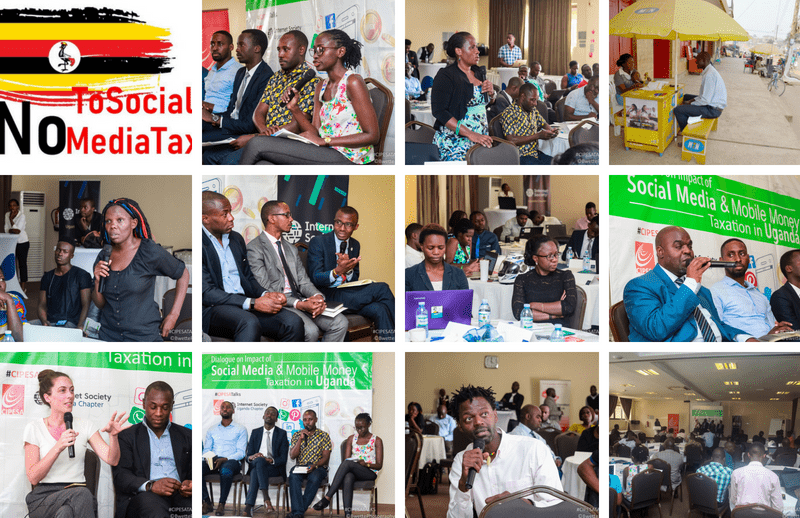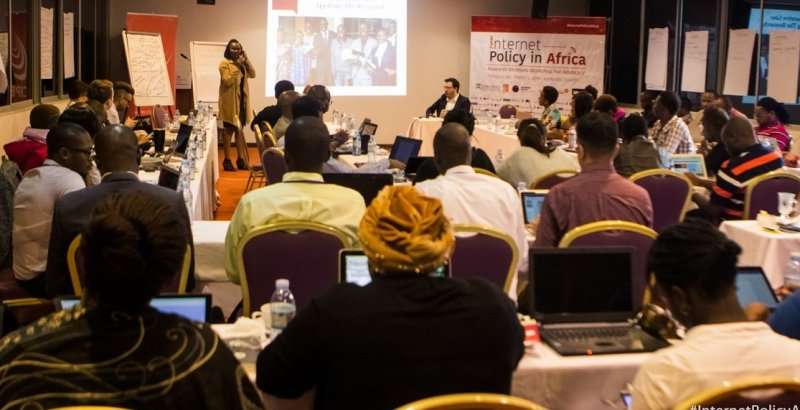Announcement |
The Forum on Internet Freedom in Africa 2018 (#FIFAfrica18) is pleased to announce the participation of the Council of Europe (CoE), through its Cybercrime Division, at the landmark event which is set to take place in Accra, Ghana, at the end of September.
The panel aims to contribute to the on-going efforts on harmonisation of national cybercrime laws with international and regional standards in the African continent, and provide a specific focus on human rights safeguards. International experts, with background on drafting, implementing and enforcing cybercrime legislation, will facilitate an interactive discussion with the participants by introducing the current state of cybercrime legislation in the African continent, debating the progress made in the recent years and discussing the entailed human rights challenges.
FIFAfrica convenes various stakeholders from the internet governance and online rights arenas in Africa and beyond to deliberate on gaps, concerns and opportunities for advancing privacy, access to information, free expression, non-discrimination and the free flow of information online. This year’s forum, which runs from September 26 to 28, is hosted by the Collaboration on International ICT Policy for East and Southern Africa (CIPESA) and the Media Foundation for West Africa (MFWA).
According to recent statistics, Africa is exhibiting one of the fastest growth rates in Internet penetration worldwide, with digital connectivity that has almost tripled in the last five years. In the same period, both governments and private sector entities in Africa have been experiencing an equally increasing trend of cyber-attacks.
The CoE has taken steps to protect the pillars of democracy in the digital age particularly as large-scale theft of personal data, computer intrusions, bullying, harassment and other forms of cyber violence, or sexual violence against children online, affect the extent to which the use of online tools enables participation in democratic processes. Moreover, it is notable that hate speech, xenophobia and racism may contribute to radicalisation, leading to violent extremism.
Attacks against computers used in elections and election campaigns are attacks against democracy. Daily attacks against critical information infrastructure affect national security and economic and other national interests as well as international peace and stability. Moreover, evidence in relation to fraud, corruption, murder, rape, terrorism, the sexual abuse of children and, in fact, any type of crime may take the form of electronic evidence, which is volatile, often intangible and probably in other jurisdictions. And accessing such evidence also has implications for human rights and the rule of law. Effective, legally compliant and robust procedures for the identification, collection and preservation of electronic evidence are therefore essential.
It is in regard to these trends that the CoE will host a panel discussion at FIFAfrica18 that will include reference to the Budapest Convention. The convention is an international treaty that aims at providing substantive legislation and procedural powers for criminal justice authorities to effectively tackle cybercrime, while upholding rule of law and human rights. Since its entry into force in 2004, the Budapest Convention has proven to be a solid baseline for enhanced cooperation across borders, and many governments in Africa, as well as in the rest of the world, have undertaken legal reforms using it as a guideline.
Zambia Introduces Daily Tax on Internet Voice Calls
By Daniel Mwesigwa |
The government of Zambia is set to introduce a daily levy of 30 Ngwee (USD 0.03) on internet voice calls. In a press statement issued after a cabinet meeting on August 12, 2018, the government spokesperson said internet calls through platforms such as Viber, WhatsApp and Skype “threaten the telecommunications industry and jobs” in licenced telecom companies such as Zamtel, Airtel and MTN”.
Accordingly, the cabinet approved the issuance of a Statutory Instrument to “facilitate the introduction of the tariff to be charged through mobile phone operators and internet providers.” In justifying the introduction of the levy, the government spokesperson cited research which showed that “80 percent of the citizens are using WhatsApp, skype, and Viber to make phone calls.”
The statement did not indicate when the statutory instrument would be introduced, or when the levy is anticipated to take effect. The new tax, according to reports quoting the communications minister, was expected to fetch USD 22 million annually.
The proposed levy adds to Zambia’s mixed record on ICT access and freedom of expression online. The Zambia Information & Communications Technology Authority (ZICTA) reports a mobile phone penetration rate of 81.9% and mobile internet penetration rate of 47.1%. However, mobile and internet proliferation is threatened by high costs of access, a digital divide between men and women and between rural and urban areas. Quality of service also remains poor as evidenced by the recent fines slapped by ZICTA on the three leading telecommunications service providers.
The Media Institute of Southern Africa (MISA) Zambia Chapter and a collective of bloggers have expressed deep concern about the tariffs on internet calls. They asked government to shelve the plans to introduce the tariff and to instead undertake efforts to promote affordable internet access. They argued that the “underlying objective” of the tariff is to “stifle free expression of millions of Zambians who increasingly depend on online tools to communicate.” They added that it is a “threat to entrepreneurship and innovation as many youths and citizens are using internet platforms to advance their socio-economic activities.”
Meanwhile, the Zambian cabinet has also approved the introduction of the Cyber Security and Cyber Crimes Bill that will repeal and amend provisions of the Electronic Communications and Transactions Act No. 21 of 2009. The bill will purportedly “promote an increased cybersecurity posture, facilitate intelligence gathering, investigation, prosecution and judicial processes in respect of preventing and addressing cybercrimes, cyber terrorism and cyber warfare.”
In addition to facilitating the establishment of Zambia National Cyber Security Agency (ZNCSA), which is expected to serve as the “coordination centre for all matters related to cyber security at national and international levels”, the proposed law will also criminalise “computer-based offences and network-related crime in line with the Penal Code”. Furthermore, it will “provide for investigation and collection of evidence for computer and network related crime and also provide for the admission of electronic evidence for such offences” as well as “adequately deal with various crimes committed using social media platforms.”
Zambia’s move becomes the latest in a string of steps taken by African governments to undermine internet access and affordability, and weaken the potential of the internet and related technologies to promote free expression, access to information and civic participation. In March 2018, Uganda’s communications regulator issued a directive requiring online content providers to register and pay an annual fee of USD 20. Shortly thereafter, in July 2018, social media taxes were introduced with users required to pay a daily levy of Uganda Shillings (UGX) 200 (USD 0.05) before regaining access to social media platforms which were blocked.
In neighbouring Tanzania, online content service providers and producers have to pay over USD 900 to register with the state for permission to maintain their platforms, according to new 2018 regulations. Meanwhile, in the Democratic Republic of Congo, in mid June, the ministry of communications issued a decree giving online media outlets a month to comply with new regulations or face harsh penalties.
Why Uganda’s Government Should Take a Different Path to Social Media and Mobile Money Taxation
Statement |
There has been widespread concern over newly introduced levies on social media access and mobile money transactions in Uganda, which are widely considered a threat to internet access and affordability, as well as to freedom of expression and access to information. The effects of the taxes that took effect on July 1, 2018, were the focus of discussions at a recent stakeholder dialogue organised by the Collaboration on International ICT Policy for East and Southern Africa (CIPESA) and the Internet Society Uganda Chapter.
At the dialogue, entrepreneurs, journalists, lawyers, activists, technologists, and academics shared their perspectives and experiences, resulting in a set of recommendations to the government on alternatives to the current modes of taxation.
The government says the taxes are needed so as to expand the country’s tax base. In the 2018/2019 national budget speech, the finance ministry estimates that up to UGX 486 billion (USD 131 million) could be collected annually by 2022 from taxes on social media Over-The-Top (OTT) services.
However, presenting early results on an ongoing study on the impact of the taxes, Dr. Christopher Stork of Research ICT Solutions stated that the country’s rural-based users of social media and mobile money will be hardest hit by the taxes, increasing the percentage of the unconnected and resulting in decreased revenue for telecom/ internet operators. He said this would ultimately lead to reduced growth in the gross domestic product (GDP) and hamper job creation.

Image above: Comparison of taxes against average income across regions in Uganda | Source: Research ICT Solutions

Image above: Prepaid products user tax burdens | Source: Research ICT Solutions
This study’s preliminary results affirm earlier contentions, such as by the After Access researchers, that those who marginally afforded internet services before the taxes were introduced are likely to now find internet use totally unaffordable, thereby increasing the percentage of the unconnected.
Meanwhile, Dr. Abdul Busuulwa, Executive Director at Community Based Rehabilitation (CBR) Africa Network, said whereas social media and mobile money platforms had eased the lives of persons with disabilities (PWDs),However, the increased cost of accessing these platforms due to the new taxes had reversed these gains. He said platforms like WhatsApp were helping in disseminating critical information among people with hearing difficulties before the added cost of using social media rendered them unaffordable to members of these groups, who he said already faced challenges in finding employment and often relied on financial support from others.
The impact of the taxes on the use of online platforms for civic engagement on local governance was described by Samuel Mumbere, ICT Officer at the Kasese District Local Government in Western Uganda. According to Mumbere, whereas introduction of the taxes had prompted a rise in the use of Virtual Private Networks (VPNs) by community members who needed to maintain avenues of social accountability and access to information in the district, many were concerned about the additional costs related to data usage by some VPN products.
On the access to justice front, the online legal knowledge and support platform, Barefoot Law, was cited as a social media-based service that had enabled citizens to access legal support and services which the poor are often excluded from due to financial constraints. Such platforms are also threatened with reduced use by citizens due to the taxes.
Those in e-commerce cited barriers to accessing their clients, and reduced competitiveness of their products and services, due to the taxes. The Managing Director of Jumia Uganda noted that the company’s work with some 3,000 different sellers, 1,000 hotels, and over 200 restaurants had experienced strained operations as their operations relied greatly on social media.
Although the mobile money transactions tax is under review, with a new bill tabled before parliament proposing to reduce the tax from 1% to 0.5%, this does little to address the impact the tax will still have on financial inclusion. Feminist and writer, Edna Ninsiima, highlighted the role that mobile money has played in empowering unbanked women. She said the new transaction fees are affecting the financial independence of women – including building a savings culture – where it had been growing steadily.
Meanwhile, Kojo Boakye, Public Policy Manager, Access and Connectivity, Facebook, cited the counter impact of the taxation on digital dividends including efforts to extend connectivity and broadband penetration. He questioned the likelihood of the tax raising the projected revenue, adding that the tax could also have an impact on the investment decisions of investors in infrastructure. In 2017, Facebook, in partnership with Airtel Uganda and Bandwidth and Cloud Services (BCS) Uganda announced a USD 100 million project to lay nearly 800 km of fibre optic cable in north-western Uganda. Like Facebook, Google has also worked to extend connectivity in Uganda with infrastructure investments including a wifi project in the capital, Kampala.
Overall, participants at the dialogue pointed out that the taxes are not only discriminatory in nature but also disenfranchise already marginalised and vulnerable communities including PWDs, women, youth and rural communities. They called on the government to reassess its position on the taxes without inhibiting growth in ICT usage and innovation. The dialogue was also introspective with many noting that more proactive and collaborative efforts should be pursued by non-state actors, especially research and participating in consultative policy processes, to enhance informed decision-making by the government.
Unmasking Digital Security Threats facing Human Rights Defenders in Uganda and Tanzania
By Lillian Nalwoga |
Technology presents various challenges to the protection of human rights such as the lack of adequate avenues to verify authenticity of information shared, violation of the right to privacy, respect to copyright issues and the right to anonymity among others. With a shrinking civic space in Uganda and Tanzania, Human Rights Defenders (HRDs) need to be more vigilant in securing their digital environments.
In both countries, government has increased clampdown on human rights organisation – including intimidation and arrests of HRDs, closure of their offices and harassment of social media users. Despite moderate digital security threat perception rating, the occurrence of malicious attacks at both organisational and personal levels are still present among many HRDs in both countries from state and non-state actors. For Uganda, past reports have also indicated authorities in Uganda intensifying their efforts to obtain spyware and surveillance equipment. While in Tanzania, government’s growing appetite for stifling citizens’ digital rights has been on the rise with the most recent issuance of regressive online content regulations being another blow to the already declining internet freedom in the country.
These deductions require an awareness of the digital security threats faced by HRDs, a clear understanding and implementation of internet freedom legalisation affecting their works and different digital security tools that they can use to protect their online privacy.
The Collaboration for International ICT Policy in East and Southern Africa (CIPESA) in partnership with Kampala based tech hub, Outbox and Sahara Ventures in Tanzania between November and December 2017, hosted a series of digital clinics, where HRDs and technologists shared insights on various forms of digital security threats and how to collaboratively develop effective digital security strategies in advancing digital rights protection in Uganda and Tanzania.
The digital security clinics provided an opportunity for techies and HRDs to explore and discuss digital security challenges as well as the need to promote Internet freedom in both countries. Additionally, the clinics exposed participants to digital safety tools and practices; legal and regulatory frameworks and knowledge on how to apply them in their day-to-day activities.
At the Uganda workshop, Immaculate Nabwire, a digital security trainer with Defend Defenders spoke inextricable link between digital security and human rights noting that the lack of digital security exposes valuable work and vulnerable communities to immense risk.
Participants explored some of the risks which lurk online including the various forms of digital attacks such as malware attacks, ransomware attacks, password attacks, phishing, Denial Of Service (DoS) alongside the extent of control one has over information that is shared online particularly – including in perceived closed spaces such as Facebook and Whatsapp groups.
To address these security gaps, some of the tactics and tools shared in both countries included the use of password managers through to basic methods such as the regular changing of passwords; use of –anonymity and circumvention tools such as Tor Browser; DuckDuckGo Search Engine and Opera Free VPN); Malware Protection tools; data encryption tools, among others.
In Tanzania, participants also analysed open source encryption tools – Mailvelope , Signal, and Martus for their strengths and weaknesses in use by HRDs. Elements tested included: – User Experience and UX Design (ease of installation, internet speeds, literacy levels, language); Penetration Testing and Security Breach (level of confidentiality in securing user communication) and Localization (compatibility with other interfaces). A similar exercise was conducted in Uganda, in 2015 were 5 digital security tools where tested. Whereas the 2015 exercise identified “lack of an attachment encryption function” for Mailvepe tool and “no option for retrieving a lost encryption key” for Martus, this was not the case for Tanzania developers.
Tool test findings in Tanzania
| Tool | Strength | Limitation |
| Martus | · Easy to install even for people with low digital security skills –· Provides a high confidence to use as no known security breaches have been documented· Compatible for all operation systems (OS) · Can be used as a desktop application |
Only operates with an internet connection and is affected by slow internet speed |
| Signal | · Easy to install· It can be used as a desktop or mobile application.· Can be used as a message app (does not require internet connection) or as a messenger app (require internet connection) |
· The app comes with only two themes (dark and light) pre-installed, there’s no option to add additional themes.· Signal App requires internet connection which isolates users with feature phones and data subscription capacity.· Can only be used by Android and IOS users can, thus isolating a large percentage of phone users with other operating systems |
| Mailvelope | · Easy to customization, can add as many email service vendors as possible.· Easy installation. · Can be translated in more than 35 languages in transfix. |
The extension is not available in other browsers like Safari for Mac users |
The November 2017 engagements in Uganda highlighted the absence of a data privacy and protection law as major concern to the protection of their data at both national and global level. A draft Data Privacy and Protection bill (2015) currently remains before Parliament and awaits passing having been introduced in 2014. In Tanzania, participants called upon the government to use technology as a tool to promote development, not as a catalyst for social chaos.
Participants were further urged to make more informed decisions on the risks they expose themselves to online including – examining the amount of information they share directly, and that shared indirectly through members of their social networks. Indeed, as software increasingly mimics human behaviour and continues to mutate, the need for more agile digital security practices is needed to match these changes.
These events were part of CIPESA’s wider activities on building the digital rights knowledge as well as digital security, safety and capacity of human rights defenders, media, vulnerable women organisations in five African countries – Burundi, Ethiopia, South Sudan, Tanzania and Rwanda and supported by the Open Technology Fund (OTF).
MLDI to Host a Strategic Digital Rights Litigation Workshop at FIFAfrica18
Announcement |
Litigation has been recognised as a potentially effective tool in removing restrictions on the free flow of information online in countries with repressive internet regimes. Increasingly, some initiatives are seeking to encourage collaboration among different actors in strategic litigation for a free and open internet.
Indeed, various cases in litigation for the respect and realisation of digital rights have recently been recorded in Cameroon, Kenya, Burundi and Gambia, among other countries in Africa.
Yet still, litigation remains under-utilised because of a lack of effective collaboration between different actors: lawyers, activists, academics, technical experts and other members of civil society.
Accordingly, the Forum on Internet Freedom in Africa (FIFAfrica) 2018 will serve as an opportunity for the Media Legal Defense Initiative (MLDI) to build the capacity of internet activists to collaborate across disciplinary silos to more effectively push back against regressive legal frameworks that are not conducive to access and use of the internet in Africa.
Sessions at the workshop will explore the meaning of strategic litigation and examine relevant comparative and international legal standards drawing on judgments from regional courts. Together with participants, MLDI will analyse the legal issues that can arise in the context of digital rights and freedom of expression through three case studies. Through interactive group sessions, participants will examine how the comparative and international standards can be applied in practical terms.
The workshop, scheduled to take place on September 26, 2018, is aimed at enhancing the strategies for future digital rights and online freedom of expression litigation and advocacy in Africa. It builds on the foundations set in knowledge and skills for collaboration in research for internet policy advocacy as well as regional efforts targeting the legal fraternity in East and West Africa.
The 2018 workshop is the second digital rights litigation training to be held on the sidelines of FIFAfrica. The first workshop was hosted at the 2017 edition of FIFAfrica in Johannesburg, South Africa by the Berkman Klein Centre for Internet and Society at Harvard Law School and MLDI.





